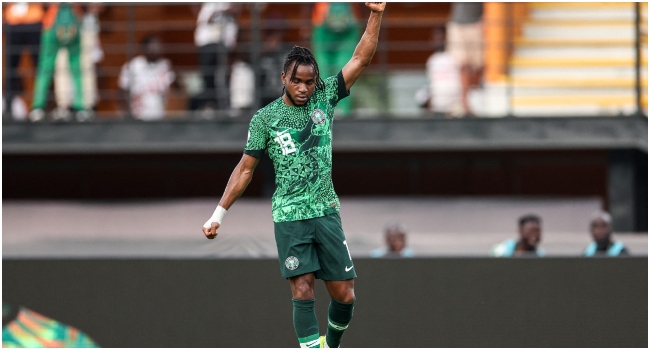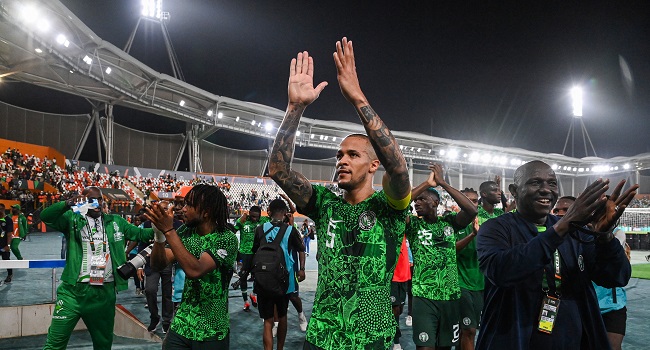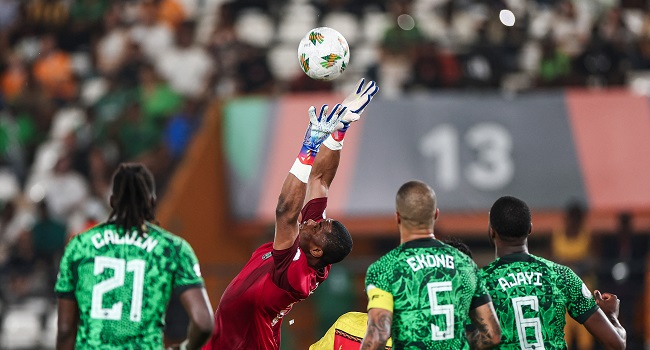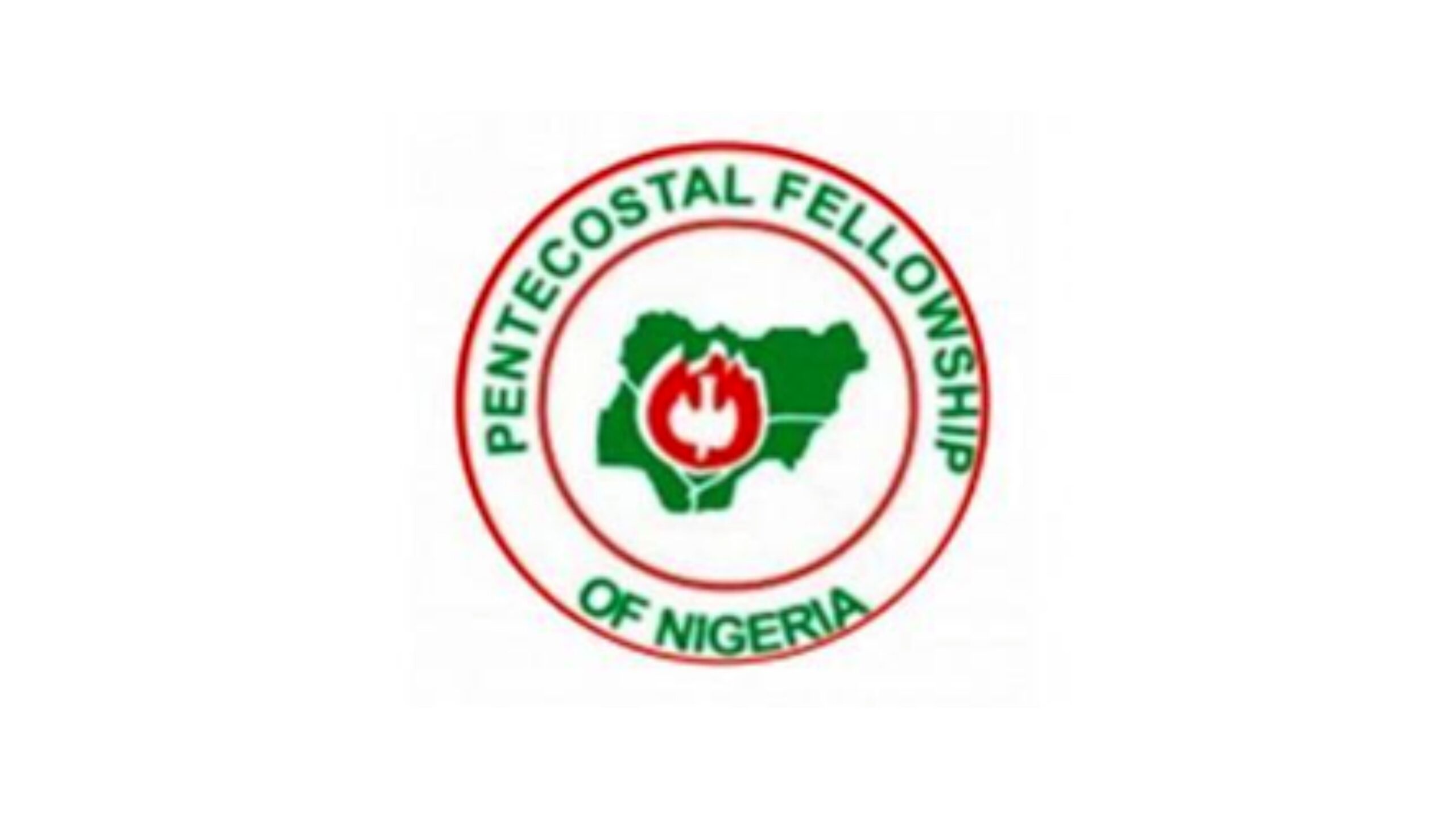Headlines
Super Eagles Beat Angola, Qualify for AFCON Semi Finals

The Super Eagles of Nigeria has defeated Angola to become the first team to book a place in the semi-finals of the ongoing Africa Cup of Nations in Ivory Coast.
Ademola Lookman was once again the hero, connecting with a cross from Moses Simon to put the Eagles in front in the 41st minute. The goal was enough to secure a place for the Nigerians in the last four of the competition.

The Super Eagles then saw the game out before a crowd of 18,757 in Abidjan, with Osimhen finding the net only for his effort to be disallowed after the VAR ruled him to be offside.
The Napoli superstar, Africa’s reigning footballer of the year, remains stuck on just one goal at this AFCON, but Nigeria’s success has been built around an impressive defence that has now kept four consecutive clean sheets.
The three-time continental champions advance to a last-four tie next Wednesday against Cape Verde or South Africa in the central Ivorian city of Bouake — those sides meet in the quarter-finals on Saturday.
Angola, meanwhile, go home but this Cup of Nations will be remembered as a success for the Black Antelopes, after they won a knockout tie at the tournament for the first time in their history.
Africa’s 28th-ranked side battled bravely here but could not follow up their victory over Namibia in the last round.

In fact, Jose Peseiro’s Nigeria side struggled to reach the same heights as against Cameroon six days earlier, undoubtedly affected by the heat and humidity which was even more energy-sapping than at previous points in the competition.
Angola almost took the lead inside four minutes, as a corner from their right was helped on to Mabululu, whose attempt at the near-post was kept out by Stanley Nwabili, the Nigerian goalkeeper who had passed a fitness test to play.
Osimhen tried his luck twice from headers but it was Lookman, the Atalanta forward and former England Under-21 international, who broke the deadlock in the 41st minute.
Moses Simon collected a pass on the left, accelerated away from Kialonda Gaspar and drove into the area before cutting the ball back for Lookman to finish emphatically.
Angola almost took the lead inside four minutes, as a corner from their right was helped on to Mabululu, whose attempt at the near-post was kept out by Stanley Nwabili, the Nigerian goalkeeper who had passed a fitness test to play.
Osimhen tried his luck twice from headers but it was Lookman, the Atalanta forward and former England Under-21 international, who broke the deadlock in the 41st minute.
Moses Simon collected a pass on the left, accelerated away from Kialonda Gaspar and drove into the area before cutting the ball back for Lookman to finish emphatically.

Nigeria continued to create chances after the break, but Angola did pass up a glorious opportunity to draw level just before the hour mark.
AEK Athens striker Zini, on as a half-time substitute, was sent through on goal and his effort beat Nwabili, only to rebound back off the far post.
It was a major let-off for Nigeria, who then thought they had killed the game off when Osimhen rose to head home a Lookman free-kick with quarter of an hour left, the ball going in despite the Angolan goalkeeper getting a touch.
However, the effort was disallowed to the frustration of Osimhen, who carried on until the final moments despite taking a succession of knocks and being carried to the side of the pitch on a stretcher at one point.
Headlines
Trump Didn’t Lie, There’s Christian Genocide in Nigeria, PFN Insists

The Pentecostal Fellowship of Nigeria (PFN) has insisted that there is Christian genocide ongoing in Nigeria, hence demanding end to the alleged Christian killings.
Speaking on Thursday after an emergency executive meeting of the Fellowship held at its national headquarters in Lagos, PFN President, Bishop Francis Wale Oke, said the body would no longer remain silent while Christians are “targeted, killed, raped, and displaced” across the country.
He said: “There is Christian genocide going on in Nigeria. If we call it by any other name, it will bring Nigeria down. We are crying out to our international friends, beginning with America and Donald Trump. Whatever you can do to help our government put an end to it, come quickly and get it done. When on Christmas Day, Christmas Day was turned a bloody day in Benue State, and hundreds were massacred. And we are to be conducting mass funerals when we are not in open conflict. What do you call that? And this is different from individual cases.
“Let us call a spade a spade. There is Christian genocide ongoing in Nigeria,”Bishop Oke declared.
“Even while we speak, killings are still taking place in Borno, Plateau, and Benue states. When 501 Christians were massacred in Dogon Noma in Plateau, what do we call that? When Christmas Day turned into a bloody day in Benue, with hundreds massacred, what name should we give it?
While noting that the United States President Donald Trump spoke the truth, the PRN President cited the case of Leah Sharibu who was abducted alongside other Chibok girls and has since remained in captivity.
“Like the case of Leah Sharibu. Where is Leah Sharibu? Like the case of Deborah that was lynched and burned alive in Sokoto? What about that? And several of our girls were kidnapped and forced, given out as wives by force without the consent of their parents and their Christian parents. And the Christian parents would not see them for years.And this has been going on. We have been talking and we are not taking it seriously. And it has been going on again and again, until Donald Trump now spoke. And Donald Trump spoke the truth. There is Christian genocide going on in Nigeria.
“Like you will have picked in the news, even since this narrative began, killing was still going on in Borno, in Plateau, in Benue, up until yesterday. What are we saying? When 501 Christians were massacred in Dogonaya in Plateau State, what do we call that? And for no offense other than they are Christians.”
Oke recalled that the Christian community had repeatedly called the attention of the government to the alleged genocide with no decisive action from the authority.
The cleric expressed his backing for President Trump’s intervention, adding that Trump only echoed what Nigerian Christians had been saying for year
“I was part of the team that went to see the immediate past President, Muhammadu Buhari. We spoke very strongly about this and the President listened to us, but he completely ignored the main issue we came for, If we came and spoke with such vehemence, with such passion, and then you pick the peripheral matter and left this matter alone, I knew that day that his government was complicit in what was going on,” he added.
Oke alleged that the killings across parts of Nigeria were systematic and targeted on Christians, lamenting that the killings had continued unchecked despite repeated appeals from the Church.
“The evidence is all over the place. There is nothing anybody can say that can whitewash it. It is evil, it is blood shedding, it is mass murder and it is genocide. The time to stop it is now. That is what the church in Nigeria is saying with one voice.
“Christians in this nation must be free to practice their faith in any part of Nigeria as bona fide citizens of Nigeria.
“These armed bandits, Fulani herdsmen, Boko Haram, ISWAP, all of them using Islam as a cover. We have been living in peace with our Muslim brothers for a long, until this violent Islamic sect came up with an intent to make sure they impose Sharia on all Nigerians,” Oke said.
Bishop Oke called on President Bola Tinubu to decisively overhaul the nation’s security architecture, and ensure justice for victims of religious violence. He questioned why those responsible for notorious attacks—such as the killing of Deborah Samuel in Sokoto and the abduction of Leah Sharibu and the Chibok schoolgirls—remain unpunished.
“The government should prove by action, not words, that it is not complicit,” he said. “When hundreds are buried in mass graves and the whole world sees it, who can deny it? Why should we play politics with the blood of Nigerians?”
The PFN urged President Tinubu’s administration to rebuild trust by ensuring that the security architecture of the country is not infiltrated by those sympathetic to extremist ideologies.
Oke further condemned the government’s rehabilitation of so-called “repentant terrorists,” describing the move as a grave security.
He assured Christians that the PFN would continue to speak out until the killings stop. “We are not going to keep quiet. We will keep raising our voices until justice is done and every Nigerian, regardless of faith, can live in peace. The truth may be suppressed for a time, but it cannot be buried forever,” he said.
The meeting, which drew PFN leaders from across the country, reaffirmed the body’s commitment to national unity, peace, and the protection of fundamental human rights, while urging the media to “side with the oppressed” and report the truth without fear or bias.
Headlines
Trump Signs Spending Bill to End Longest Government Shutdown

US President Donald Trump has signed a federal spending bill, officially ending the longest government shutdown in American history.
The legislation, passed by the House of Representatives in a 222–209 vote, followed narrow approval in the Senate just two days earlier. The bill restores funding to federal agencies after 43 days of closure, bringing relief to millions of government employees and citizens affected by halted services.
Speaking after signing the measure on Wednesday night, Trump described the deal as a political victory, asserting that Democrats unnecessarily prolonged the shutdown.
“They didn’t want to do it the easy way. They had to do it the hard way, and they look very bad,” he said.
The temporary funding bill maintains government operations only through 30 January, creating a new deadline for lawmakers to negotiate a long-term budget solution.
As part of the agreement, Senate leaders committed to an early December vote on Obamacare subsidies, a key priority for Democrats during the shutdown standoff.
In addition to reopening federal offices, the bill provides full-year funding for the Department of Agriculture, military construction projects, and several legislative branch offices.
It also ensures retroactive pay for federal workers affected by the shutdown and allocates funding to the Supplemental Nutrition Assistance Program, SNAP, which helps about one in eight Americans access food.
The shutdown, which began in October, forced the suspension of many government services, leaving an estimated 1.4 million federal employees either furloughed or working without pay. It also disrupted food assistance programmes and caused widespread delays in domestic air travel.
With federal operations now resumed, attention in Washington has turned to whether Congress and the White House can reach a longer-term funding agreement before the new deadline at the end of January.
Headlines
FG Halts Planned 15% Import Duty on Diesel, Petrol

The Nigerian Midstream and Downstream Petroleum Regulatory Authority (NMDPRA), on Thursday, announced discontinuation of the planned 15 per cent duty on imported petroleum products.
NMDPRA’s Director, Public Affairs Department, George Ene-Ita, conveyed the development in a statement while warning the public to shun panic buying.
President Bola Tinubu, on October 29, approved an import tariff on petrol and diesel, a policy expected to raise the landing cost of imported fuel.
The President’s approval was conveyed in a letter signed by his Private Secretary, Damilotun Aderemi, following a proposal submitted by the Executive Chairman of the Federal Inland Revenue Service, Zacch Adedeji.
The proposal sought the application of a 15 per cent duty on the cost, insurance, and freight value of imported petrol and diesel to align import costs with domestic market realities.
Implementation was slated to take effect on November 21, 2025.
The policy aimed to protect and promote local refineries like the Dangote Refinery and modular plants by making imported fuel more expensive.
While intended to boost local production, it is also expected to increase fuel costs, which could lead to higher inflation and transportation prices for consumers.
Experts have argued that the move could translate into higher pump prices for consumers, with some estimating an increase of up to N150 per litre or more.
In an update, however, NMDPRA said the government was no longer considering going ahead with implementing the petrol import duty.
“It should also be noted that the implementation of the 15% ad-valorem import duty on imported Premium Motor Spirit and Diesel is no longer in View,” the statement read in part.
Meanwhile, the NMDPRA also assured all that there is an adequate supply of petroleum products in the country, within the acceptable national sufficiency threshold, during this peak demand period.
“There is a robust domestic supply of petroleum products (AGO, PMS, LPG, etc) sourced from both local refineries and importation to ensure timely replenishment of stocks at storage depots and retail stations during this period.
“The Authority wishes to use this opportunity to advise against any hoarding, panic buying or non-market reflective escalation of prices of petroleum products.
“The Authority will continue to closely monitor the supply situation and take appropriate regulatory measures to prevent disruption of supply and distribution of petroleum products across the country, especially during this peak demand period.
“While appreciating the continued efforts of all stakeholders in the midstream and downstream value chain in ensuring a smooth and uninterrupted supply and distribution, the public is hereby assured of NMDPRA’s commitment to guarantee energy security,” the statement added.






